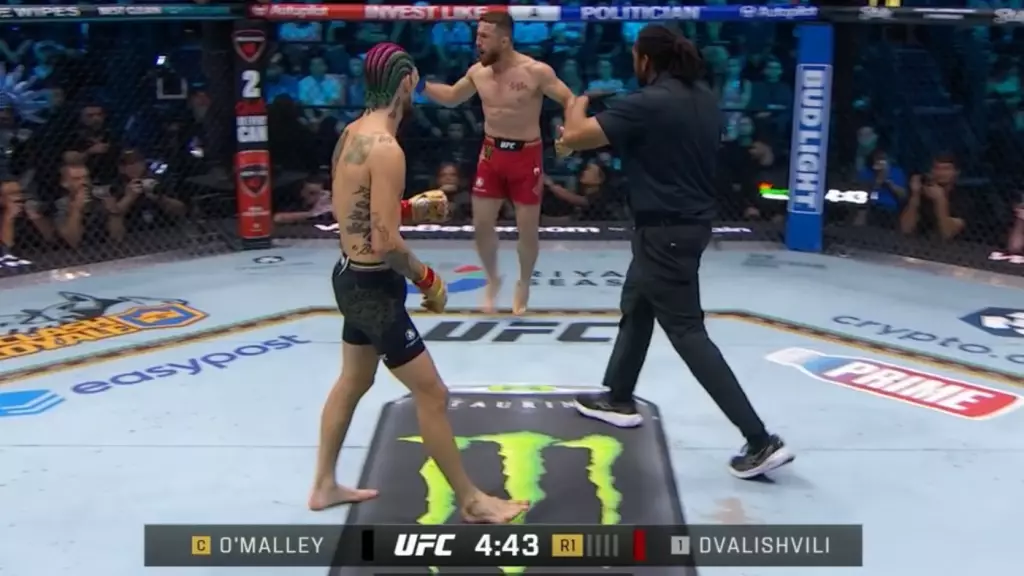UFC 306 featured a headline bout that generated significant conversation, not just for the athletes’ performance but for an unexpected twist that unfolded right at the beginning of the main event. The fight witnessed bantamweight challenger Merab Dvalishvili take on the reigning champion, Sean O’Malley, but it was a moment involving Tim Welch, O’Malley’s head coach, that set the stage for intrigue. Instead of starting off strong with an intense competition, we were presented with an unexpected distraction that left fans and commentators questioning what had transpired.
Tim Welch indicated in the aftermath that he had anticipated the potential difficulties Merab Dvalishvili brought to the ring. This foresight could explain why Welch appeared to provoke his opponent early in the fight. Just seconds into the bout, Dvalishvili’s response to Welch’s incitement was immediate and vocal, demonstrating the psychological stakes involved in this title fight.
As Dvalishvili pointed and shouted toward O’Malley’s corner, referee Herb Dean intervened, halting the action to address the unfolding commotion. Dean’s clear message—to keep the focus on the fight and not on the sidelines—encapsulated a critical principle in combat sports: distractions can derail performance. While Welch later expressed surprise at Dvalishvili’s heightened reaction, it highlights the emotional intensity that accompanies such prestigious contests.
Through Dvalishvili’s perspective, we gain insight into his mindset leading into the bout. He maintained that his intent was to remain focused and professional, questioning the approach taken by O’Malley’s camp. Dvalishvili highlighted past experiences, particularly a precedent set during UFC 292 when he felt similarly provoked. His reaction was not simply an emotional outburst but rooted in a string of perceived disrespect from his opponent’s team.
With this context, the moment resonates deeper than mere antics; it strikes at the heart of sportsmanship. Athletes often wrestle with emotions, but how those emotions manifest in critical moments can strongly influence performance. For Dvalishvili, Welch had seemingly crossed a line, prompting a fervent response that momentarily shifted the dynamic.
In his subsequent explanations, Welch attempted to minimize the chaos. His assertion that he merely encouraged Dvalishvili to be “patient” before the bout began resonates with the notion that coaching is integral, even vital in high-stakes environments. But within athletic regulations, excessive use of verbal cues can lead to penalties. Dean’s insistence on maintaining control over the fight environment seemed to cast doubt on Welch’s approach and called into question the bounds of coaching in such high-caliber competition.
It is essential to recognize the role of communication within the circle—coaches, fighters, and officials operating within a tightly controlled framework. Welch’s good-natured intention was overshadowed by this perceived infringement. The fallout foreshadowed how emotional exchanges could ripple throughout the event and shape on-the-ground conditions leading to an athlete’s performance.
What followed this tumultuous beginning was a comprehensive demonstration of Dvalishvili’s prowess. Undeterred by Welch’s antics, he excelled over the full 25 minutes, earning a unanimous victory and establishing himself as the new bantamweight champion. This outcome implies that Dvalishvili transformed potential distractions into fuel, harnessing the emotional charge to dominate the bout.
In retrospect, UFC 306 presented more than just a title match; it reflected a microcosm of the complexities inherent in competitive sports. Emotion, strategy, and psychological resilience intertwined in a demonstration that showcases not only physical ability but the mental fortitude necessary to succeed. As criticisms and analyses circulate, one finds that this moment serves as a reminder of the thin lines between sportsmanship, competition, and the very human emotions that define them. While tensions may flare, it’s the ability to refocus and channel that energy that often determines who will emerge victorious in the octagon.

